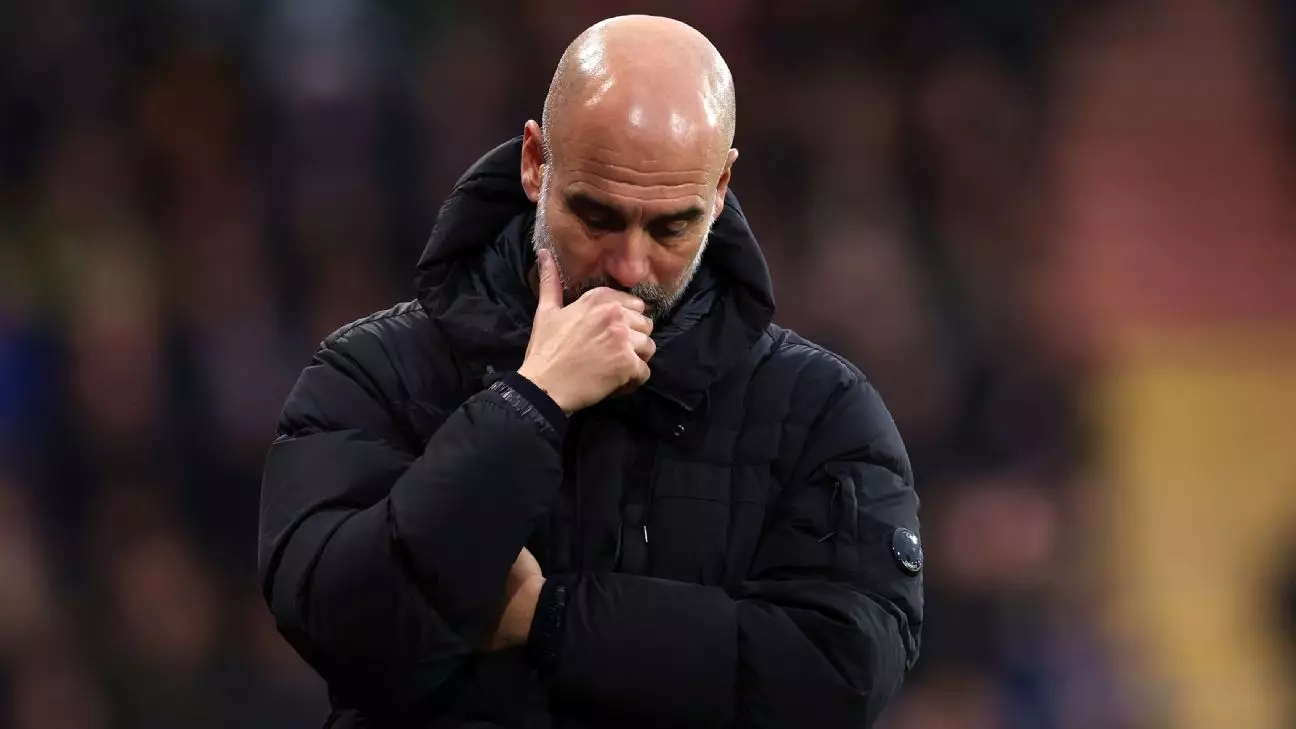In the competitive realm of football, injury crises can dramatically alter the trajectory of a team’s season. Such was the case for Manchester City, whose astounding 32-game unbeaten run in the Premier League came to an abrupt halt following a 2-1 defeat against Bournemouth. This defeat not only shocked fans but also highlighted a significant turn in the title race, placing City two points behind Liverpool, who managed to secure a victory over Brighton & Hove Albion on the same day. The implications of this match resonate beyond just points; it signals a potential vulnerability in a squad previously regarded as virtually invincible.
Despite the injuries crippling his squad, manager Pep Guardiola was firm in his refusal to attribute the loss solely to this adversity. His post-match comments reflected a desire to maintain a strong front, suggesting that while injuries undoubtedly affected the team, they were not the definitive reason for the loss. “I would like to tell you if these players weren’t injured, we would have won, but nobody knows,” Guardiola remarked—a statement underscoring the unpredictable nature of football and the intricate balance of factors that contribute to success or failure in matches.
The reality, however, is more nuanced. Guardiola’s claims of effort and commitment from the players were overshadowed by observations of their struggle to match Bournemouth’s intensity. It was this intensity, paired with effective strategies, that ultimately secured Bournemouth’s historic victory over the reigning champions.
The growing list of absent players has raised concerns about Manchester City’s depth and resilience. Key figures such as Jack Grealish, Rodri, and Oscar Bobb were sidelined, with Guardiola lamenting the effect on the team’s overall rhythm and cohesion. In his pre-match address, he tentatively revealed his worry that he might have only 11 senior players fit to face Bournemouth, indicating just how precarious the team’s situation had become.
The injuries expose an urgent need for squad rotation and tactical adaptation. Guardiola suggested that some players may have played through pain, a testament to the sacrifices athletes are often required to make. This raises questions about player management and whether the coach overestimated the available resources amidst such overwhelming adversity.
The match itself reflected a battle of wills. Bournemouth surged to an early lead thanks to goals from Antoine Semenyo and Evanilson, capitalizing on Manchester City’s defensive lapses. City struggled to perform the fundamental aspects of their game—particularly the ability to win crucial aerial duels and long balls, which allowed their opponents to dictate play. The body language of City players during the match suggested fatigue and frustration, with Guardiola later acknowledging that many of his squad lacked the necessary sharpness owing to limited training opportunities.
“We couldn’t match up to the intensity…Our central defenders and strikers have to defend deeper,” Guardiola admitted. Such revelations point to a deeper systemic issue within the team regarding preparedness and adaptability in the face of injury-induced challenges.
As City regroup following their defeat, they face an arduous schedule with a Champions League clash against Sporting in Lisbon imminent. The pressure to perform remains high, and with an injury-laden squad, the challenges could compound. Captain Kyle Walker voiced a sentiment that many would resonate with: “We don’t use that as an excuse,” yet the underlying truth remains—had the team been healthier, their outcomes might have differed drastically.
Bournemouth’s victory not only disrupted City’s rhythm but also emboldened the Cherries’ spirit, a reality that other teams in the league cannot afford to overlook. Manager Andoni Iraola celebrated the victory as more than just a historical milestone, emphasizing the importance of playing without fear—an approach that could serve as a model for other underdog teams.
In this pivotal moment, Manchester City must recalibrate their strategies, heal their bodies, and mentally prepare for an intense season ahead, for in football, complacency is not an option. As evidenced by Bournemouth’s confidence, the champions must rise to the occasion, or risk being viewed as merely another opponent on the pitch.

